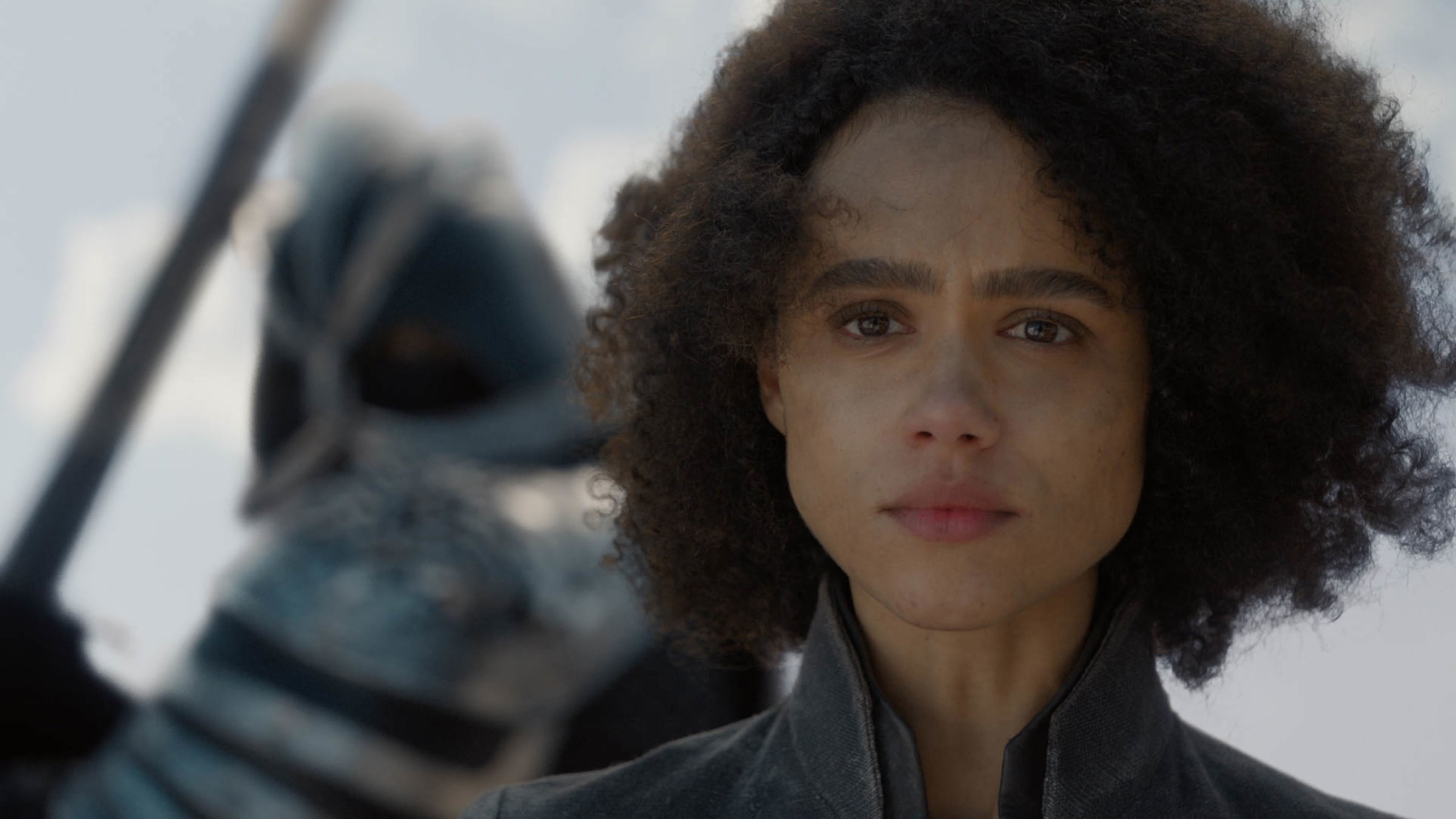Game of Thrones’ Ugliest Legacy: Failing Women

HBO
Fans, critics, and even Jessica Chastain are angry over the show’s problematic writing of female characters. On-screen and off, how does TV’s biggest show keep failing women?
Throughout Game of Thrones’ celebrated, history-making run, it has only brought on one female director and three female writers. Michelle MacLaren directed four episodes of the HBO series, the last of which aired in 2014. Jane Espenson, Vanessa Taylor, and Gursimran Sandhu have contributed to a total of nine episodes, with Espenson and Taylor’s last episodes airing in 2013.
This isn’t new information. TV critic Maureen Ryan broke down the show’s paltry female representation over the years in a Twitter thread when the credits for the final season were announced back in January 2018, a loathsome lack of representation that Salon’s Melanie MacFarland picked up in her piece, “The Final Game of Thrones Season Shuts Out Female Directors and Writers.”
(Sandhu, who is credited as a staff writer on Season 8, was not included in HBO’s initial announcement of the season’s creative lineup. She brings the total number of women employed as either a writer or director over the course of eight seasons and 73 episodes of arguably the most influential television series of the modern era to just four.)
In the wake of Sunday night’s episode, “The Last of the Starks,” there’s been a resurgence of outrage over the hit show’s male creative dominance, especially given the controversial plot decisions surrounding—and, some argue, demeaning—the series’ female characters.
The discourse surrounding those plot points has included pushback from the likes of Jessica Chastain and Ava DuVernay, in addition to many critics and fans. It underscores that, for everything Game of Thrones has done to change the face of television as we know it, failing women is its ugliest legacy.
The series has aired at a time when gender equity and opportunity have been among the industry’s most important and impassioned conversations. So, too, has there been discussion of the impact that opportunity has when it comes to the representation of women on screen. Yet both behind the scenes and in its episodes’ storylines, Game of Thrones has promoted some of the most retrograde and problematic tendencies of the industry when it comes to those conversations and the treatment of women.
“The Last of the Starks,” then, is a case study for what has been an issue throughout the series. (Warning: Several spoilers for the episode follow.)
In one scene in the episode, Sansa Stark (Sophie Turner) implies that without having survived sexual assault and psychological torture over the years, she would not have evolved into a strong woman and leader. “Without Littlefinger and Ramsay and the rest, I would have stayed a little bird all my life,” she says, which many people have interpreted as Sansa expressing gratitude to her rapist.
Jessica Chastain took to Twitter to explain why even presenting the possibility for that interpretation is irresponsible. “Rape is not a tool to make a character stronger,” she wrote. “A woman doesn’t need to be victimized in order to become a butterfly. The little bird was always a Phoenix. Her prevailing strength is solely because of her. And her alone.” (The “Phoenix” line is in reference to the X-Men film Dark Phoenix, which Chastain co-stars in with Turner.)
Responding to a thread about the show’s lack of female writers, writer Clarkisha Kent drew a connection between the representation behind the scenes and the problem with the Sansa moment.
“I would have rather Sansa been like ‘it is what it is’ to the events that lead her to this season versus basically implying getting assaulted and shit made her ‘stronger,’” she tweeted. “Just....pitiful. And def written by a cishet [cisgender heterosexual] man.”
Even just in this episode, it’s one of many examples of how the series has used violence against women as a narrative tool—one that, critics argue, it has neither earned nor justified creatively.
The episode’s shocking death was the brutal beheading of Missandei (Nathalie Emmanuel), loyal confidante to Daenerys (Emilia Clarke) and the only woman of color on the series.
Fans are predicting that the death is meant to trigger character outrage meant to raise the stakes of upcoming battle scenes, but also question whether the optics are worth it: the sensationalizing of violence against a woman of color, exploiting her life for exposition.
Ava DuVernay tweeted in response, “So…the one and only sister on the whole epic, years-long series? That’s what you wanna do? Okay.” Emmanuel herself responded to the tweet with three heart emojis.
There was a pile-up of criticisms from the episode about decisions the female characters made, from questioning Daenerys and Cersei’s strategies to the treatment of Brienne of Tarth.
After years of backlash for its use of “sexposition”—the gratuitous use of naked women and sex as set dressing—the episode makes a maddening cut away from Brienne of Tarth (Gwendoline Christie) and Jaime Lannister (Nikolaj Coster-Waldau) during a rare moment of earned romantic intimacy. Now you’re demure? Then she is stripped of all her power and agency, reduced to a lovelorn puppy begging Jaime not to leave her.
As writer Nell Scovell tweeted, “A female writer would have fought to the death to not have the weepy Brienne of Tarth scene in the last episode. Ser Brienne should have pulled her sword on Jaime and made him fight his way to Cersei’s side.”
These are all examples from one episode. But what the intense reaction to “Last of the Starks” has done is put into renewed context what have been systemic issues in the show’s treatment of women.
“The almost-exclusively male Game of Thrones directors lineup and writing staff has been pointed out time and again over the years, particularly in critiques of the exploitative nature of sex and violence towards women in its narratives,” McFarland wrote. “Almost as much digital ink has been spilled taking apart its unnuanced portrayal of gender dynamics as blood has been shed in Westeros and Essos.”
The female characters in Game of Thrones are, of course, formidable, arguably among the strongest women who have been written for television. There is no denying that women hold the power in Westeros. Their intelligence and cunning is routinely on display. Hell, after nearly a decade of hearing about how insurmountable a foe the Night King would be, it’s young Arya Stark who valiantly does him in.
But the ways in which the writers have failed these impressive women are just as important to single out. That these failings may be in direct correlation to the gender makeup of the show’s creative team wouldn’t be an inappropriate conclusion to draw.
Who knows what kinds of conversations led to the staffing of the Game of Thrones writers room and directors lineup. We’re not privy to that information. But we have all witnessed the effects of producers, networks, showrunners, and high-profile stars making active pushes for diversity and equity behind the scenes of their shows, be it Reese Witherspoon and Nicole Kidman with Big Little Lies, Ryan Murphy with his series, or DuVernay with her output.
It’s not just about who is at the table, but what those people bring to the table and the work that comes from it—what we see onscreen and then how we process the world because of that.
One could argue that a responsibility comes with popularity. No show is as popular as Game of Thrones, and there may never be one as popular again. Airing at a time when representation and that responsibility have blanketed industry discourse, it’s dismaying that a show this popular isn’t mentioned as a vehicle of progress, but instead as an example of the problem.
One could also argue that the only responsibility a show has is to its story. Gauging from reactions to Sunday night’s episode, Thrones failed at that, too. If only there might have been a way to prevent it…
